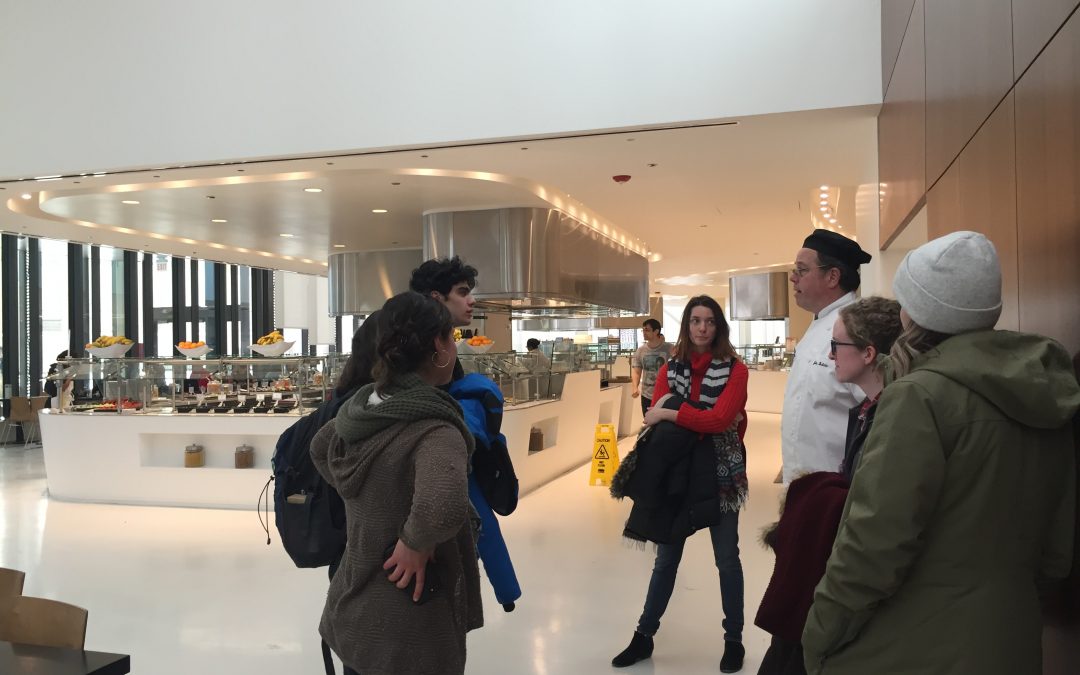By Ted Falkenhayn
As a first-year student, I am fortunate to eat at the dining halls on a daily basis, but during Sustainable Dining Week, I was given an entirely new perspective. On Thursday, February 8th, students had the opportunity to get a behind-the-scenes look at the operations of Baker Dining Halls in Campus North. Led by Executive Chef, Peter Abrahamson, I was able to see firsthand how Bon Appétit – our campus food provider – works to provide UChicago with a diverse menu of delicious and healthy, yet sustainably sourced, food options.
At various points in the tour, it was made very clear to me that Bon Appétit’s commitment to waste reduction starts with the company’s focus on locally-sourced ingredients. A remarkable fact is that nearly everything – except for certain sauces like ketchup and sugar packets – is made from scratch on site in every dining hall. With the variety of dining options that Bon Appétit provides, such as Kosher, Halal, Avoiding Gluten and Vegetarian, the need for a diversity of ingredients is essential. Cooking from scratch creates a level of freshness that surpasses meals prepared with processed ingredients from larger manufacturers. Also, since there is no nationwide regulated menu that each Bon Appétit location must follow, chefs like Peter Abrahamson can create unique menus with dishes inspired by the local supply of seasonally available produce instead of large distributors.
In order to successfully procure locally-sourced ingredients, Bon Appétit created the Farm to Fork Program, which requires that over 20% of ingredients be purchased from small, owner-operated farms and businesses within 150 miles of the dining location. My tour group was happy to learn that UChicago actually obtains roughly 25% of its produce through the Farm to Fork Program. UChicago Dining receives mixed greens from Windy City Harvest in Chicago, beef products from Heartland Meats in Mendota, Illinois, and tomatoes from Mighty Vine in Naperville, Illinois – highlighting Bon Appétit’s promise to reduce the carbon footprint of its food supply-chain by supporting the local economy
The tour ended with Chef Abrahamson telling us how Bon Appétit employs two methods – batch-cooking and using eco-digesters – to divert food from landfills. By cooking in batches, chefs can avoid over-producing certain dishes and reduce the time that cooked food sits out, meaning less is wasted at each meal and the food is as fresh as possible, which is crucial for food recovery programs. Chef Abrahamson told us that Bon Appétit has experience working with students at other colleges to implement food recovery programs, indicating that UChicago could be next. In addition, each of UChicago’s dining halls has an eco-digester – a machine that converts food waste into liquid by using a unique combination of enzymes to anaerobically digest the food so that it can be discharged as wastewater. These enzymes are very sensitive to the environment within the eco-digester and as a result, certain hot foods like soups, along with waste items like pineapple tops and clamshells which are hard to break down, cannot be digested. These stringent regulations mean that food waste from student plates cannot be put into the eco-digesters. Our eco-digesters provide an opportunity to significantly reduce our food waste, but they do not allow students like m yself to freely take excessive amounts of food on our plates – no food waste management system, whether it be composting or an eco-digester, warrants wasteful food consumption
yself to freely take excessive amounts of food on our plates – no food waste management system, whether it be composting or an eco-digester, warrants wasteful food consumption
.Having completed the tour, I felt assured knowing that UChicago and Bon Appétit are committed to making sure our food consumption is as sustainable as possible. From the sourcing of ingredients to managing our food waste, the mechanisms we have in place reduce our carbon footprint and methane gas output, all while providing a variety of quality meals. I believe that the best way to encourage sustainable practices across our university is to give students a voice and an opportunity to contribute to the mission. With the possibility of a student-led food recovery program that works in cooperation with Bon Appétit, we can further decrease our food waste, while consequently increasing student awareness of our sustainability initiatives and meaningfully engaging with our surrounding area in a truly positive way.
Ted is a first year student majoring in Environmental and Urban Studies and Economics.


